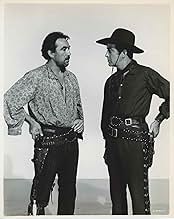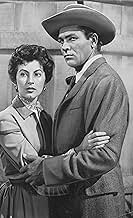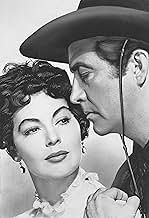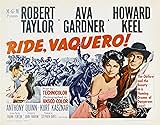IMDb रेटिंग
6.1/10
1.2 हज़ार
आपकी रेटिंग
अपनी भाषा में प्लॉट जोड़ेंTwo outlaws, Rio and Esqueda, raised together as stepbrothers, have a showdown over the issue of whether to evict new settlers from their territory.Two outlaws, Rio and Esqueda, raised together as stepbrothers, have a showdown over the issue of whether to evict new settlers from their territory.Two outlaws, Rio and Esqueda, raised together as stepbrothers, have a showdown over the issue of whether to evict new settlers from their territory.
Stanley Andrews
- Gen. Sheridan
- (बिना क्रेडिट के)
Arthur Berkeley
- Townsman
- (बिना क्रेडिट के)
Monte Blue
- Bartender
- (बिना क्रेडिट के)
Chet Brandenburg
- Townsman
- (बिना क्रेडिट के)
फ़ीचर्ड समीक्षाएं
Ride, Vaquero! is directed by John Farrow and written by Frank Fenton. It stars Robert Taylor, Ava Gardner, Howard Keel, Anthony Quinn, Kurt Kasznar and Ted de Corsa. Music is by Bronislau Kaper and cinematography by Robert Surtees.
Out of MGM and filmed in Ansco Color at Kanab in Utah (though story is set in Texas), Ride, Vaquero! is collectively unusual, bold and frustrating. Plot revolves around outlaws lead by bandido Esqueda (Quinn) refusing to let settlers and civilisation come to the Brownsville territory. So far so formulaic, then, but Esqueda's right hand man is Rio (Taylor), who was raised by Esqueda's mother and therefore they be adopted brothers. When King Cameron (Keel) and his wife Cordelia (Gardner) refuse to be shunted out of Brownsville, with King trying to rally the townsfolk against Esqueda, Rio starts to feel sympathy for the Cameron's.
What unfolds is a sort of Freudian Greek Tragedy, a love quadrilateral as Esqueda and Rio love each other in that manly brotherly way, Cordelia begins to love Rio, love which he is keen to reciprocate, while King will always love Cordelia no mater what. Action is competently put together by Farrow as it all builds to a big finale, which doesn't disappoint on narrative terms, and the airy location photography (this is one of the better Ansco Color productions I have seen) is delightful. While naturally there will be sacrifices and psychologically tinged twists along the way to keep the faithful interested.
Quinn is wonderfully ebullient, enjoying himself with a licence to chow down on the script with relish. Taylor is subdued, sleep walking through the film under direction to be a man of quiet menace and emotional confliction. Keel looks like he is desperate to sing a song, or just be some place else, while Gardner is required to just look pretty and pretty wistful from time to time. Kasznar as Father Antonio comes out in credit, but when the screenplay has him refusing stolen money to help the church - only to then have him 15 minutes later shooting away with rifle to kill his fellow man - the inconsistency in the production is further compounded.
Keel hated the boredom of the shoot, stuck out in the wilderness with nothing to do for months he said, and Gardner hated Farrow, citing him as a sleazy bully to women and horses! These complaints do show, the film feels like it's treading water, where if you take out Quinn you are left with what comes across as a bunch of actors working for food. Characterisations are not well drawn enough to make the promise of the mind matters work, and supporting players like Jack Elam wander in and out of the picture without due care and attention.
There's good intentions in the screenplay, where for 1953 this could have been ahead of its time and setting the bar for Freudian flavoured Westerns. While it's on it engages for sure, but once finished there's the distinct feeling that it was never all that it could have been. A shame really. 6/10
Out of MGM and filmed in Ansco Color at Kanab in Utah (though story is set in Texas), Ride, Vaquero! is collectively unusual, bold and frustrating. Plot revolves around outlaws lead by bandido Esqueda (Quinn) refusing to let settlers and civilisation come to the Brownsville territory. So far so formulaic, then, but Esqueda's right hand man is Rio (Taylor), who was raised by Esqueda's mother and therefore they be adopted brothers. When King Cameron (Keel) and his wife Cordelia (Gardner) refuse to be shunted out of Brownsville, with King trying to rally the townsfolk against Esqueda, Rio starts to feel sympathy for the Cameron's.
What unfolds is a sort of Freudian Greek Tragedy, a love quadrilateral as Esqueda and Rio love each other in that manly brotherly way, Cordelia begins to love Rio, love which he is keen to reciprocate, while King will always love Cordelia no mater what. Action is competently put together by Farrow as it all builds to a big finale, which doesn't disappoint on narrative terms, and the airy location photography (this is one of the better Ansco Color productions I have seen) is delightful. While naturally there will be sacrifices and psychologically tinged twists along the way to keep the faithful interested.
Quinn is wonderfully ebullient, enjoying himself with a licence to chow down on the script with relish. Taylor is subdued, sleep walking through the film under direction to be a man of quiet menace and emotional confliction. Keel looks like he is desperate to sing a song, or just be some place else, while Gardner is required to just look pretty and pretty wistful from time to time. Kasznar as Father Antonio comes out in credit, but when the screenplay has him refusing stolen money to help the church - only to then have him 15 minutes later shooting away with rifle to kill his fellow man - the inconsistency in the production is further compounded.
Keel hated the boredom of the shoot, stuck out in the wilderness with nothing to do for months he said, and Gardner hated Farrow, citing him as a sleazy bully to women and horses! These complaints do show, the film feels like it's treading water, where if you take out Quinn you are left with what comes across as a bunch of actors working for food. Characterisations are not well drawn enough to make the promise of the mind matters work, and supporting players like Jack Elam wander in and out of the picture without due care and attention.
There's good intentions in the screenplay, where for 1953 this could have been ahead of its time and setting the bar for Freudian flavoured Westerns. While it's on it engages for sure, but once finished there's the distinct feeling that it was never all that it could have been. A shame really. 6/10
If shoot 'em up westerns are to your taste, this is probably not your cup of tea.
The theme of Civilization vs. Barbarism is nicely explored in this very unusual western. The dialog is light years beyond the dialog in most westerns. Specifically, Rio's dialog is some of the best ever written for any character in any film of this genre. Whoever wrote it must have been bi-lingual. From his syntax, it is clear Rio speaks English as his second language. It is as if he is speaking Anglicized Spanish proverbs half of the time. Very Spanish.
The gay subtext is unmistakable in the scenes between Rio and Esqueda, yet it is fairly subtle. Rio's beautiful horse and its livery, and his attire all summon up images of early cinematic western heroes. Rio looks like the Cisco Kid's dark alter- ego!
It is difficult to accept Cameron's faith that Rio is honorable enough not to kill him once he turns his back. This issue really has two aspects: One is the credibility of Cameron's trust; the second is Rio's actual trustworthiness. Today we find it difficult to believe BOTH that Cameron would be so trusting of Rio and that Rio actually would turn out to be trustworthy. Our credulity is again stretched by Cameron's entrusting Rio with his ranch and wife.
But Cameron is a newcomer to the territory, and he values Rio's savvy - about horses, ranch hands and probably survival! Cameron tells Rio that he wants him to help acquire horses for the ranch. Later Cameron's wife asks Rio about the sudden abundance of ranch hands which Cameron wasn't able to hire on his own. These things validate Cameron's motive, implausible as it may seem. I just accept that Cameron is pretty desperate and that he is a good judge of character.
Regarding Rio: There was a time when a man felt like he owed his life to someone who had saved (or spared) it. Perhaps most men still lived by that code of honor at the time the movie is set. Or perhaps this was preserved longer in Hispanic culture - Rio's culture. Or perhaps Rio is simply a throw-back in his adherence to such a code. Anyway, the issue did not ruin the movie for me.
Delia seems particularly naive (or stupid) for getting Rio to take her to plead Cameron's case with Esqueda.
Despite these weaknesses, I enjoyed the film. It never really made me feel excitement, but it generated palpable tension among several characters. However, its uniqueness and dialog were what kept me interested throughout. I found Rio to be one of the most fascinating characters in this entire genre. One of my favorite scenes is when Esqueda is kicked back in his chair in the saloon with his filthy, bare feet thrust toward the camera. Nope, not your typical western!
The theme of Civilization vs. Barbarism is nicely explored in this very unusual western. The dialog is light years beyond the dialog in most westerns. Specifically, Rio's dialog is some of the best ever written for any character in any film of this genre. Whoever wrote it must have been bi-lingual. From his syntax, it is clear Rio speaks English as his second language. It is as if he is speaking Anglicized Spanish proverbs half of the time. Very Spanish.
The gay subtext is unmistakable in the scenes between Rio and Esqueda, yet it is fairly subtle. Rio's beautiful horse and its livery, and his attire all summon up images of early cinematic western heroes. Rio looks like the Cisco Kid's dark alter- ego!
It is difficult to accept Cameron's faith that Rio is honorable enough not to kill him once he turns his back. This issue really has two aspects: One is the credibility of Cameron's trust; the second is Rio's actual trustworthiness. Today we find it difficult to believe BOTH that Cameron would be so trusting of Rio and that Rio actually would turn out to be trustworthy. Our credulity is again stretched by Cameron's entrusting Rio with his ranch and wife.
But Cameron is a newcomer to the territory, and he values Rio's savvy - about horses, ranch hands and probably survival! Cameron tells Rio that he wants him to help acquire horses for the ranch. Later Cameron's wife asks Rio about the sudden abundance of ranch hands which Cameron wasn't able to hire on his own. These things validate Cameron's motive, implausible as it may seem. I just accept that Cameron is pretty desperate and that he is a good judge of character.
Regarding Rio: There was a time when a man felt like he owed his life to someone who had saved (or spared) it. Perhaps most men still lived by that code of honor at the time the movie is set. Or perhaps this was preserved longer in Hispanic culture - Rio's culture. Or perhaps Rio is simply a throw-back in his adherence to such a code. Anyway, the issue did not ruin the movie for me.
Delia seems particularly naive (or stupid) for getting Rio to take her to plead Cameron's case with Esqueda.
Despite these weaknesses, I enjoyed the film. It never really made me feel excitement, but it generated palpable tension among several characters. However, its uniqueness and dialog were what kept me interested throughout. I found Rio to be one of the most fascinating characters in this entire genre. One of my favorite scenes is when Esqueda is kicked back in his chair in the saloon with his filthy, bare feet thrust toward the camera. Nope, not your typical western!
A decent cast and director but weak material and certainly does not represent any of the leading actors' best work.
The plot has been recounted by other reviewers.
Judging an actors' performance is subjective of course but I thought Quinn's acting self-indulgent and much to one dimensional.
Another reviewer mentioned that this title was not in Maltin's Movie Guide. It is listed in his Classic Movie guide which covers movies prior to 1960. His review books do not contain every film ever made. Typically movies that received scant theatrical release, were released direct to video, or were TV movies. I don't remember an instance where a major studio film with A list actors was not listed.
I've always felt that Ride Vaquero was one of the weakest of Robert Taylor's westerns. In playing Rio, Taylor certainly essayed one of the darkest characters he ever brought to the screen.
It's the end of the Civil War and bandit Anthony Quinn has certainly had his run of things in the area. But the Yankee army will be occupying Texas shortly. Common sense would dictate that Quinn realize the jig is up that he'd better move on. At least his foster brother Taylor thinks so, but Quinn is drunk with power and he ain't going nowhere.
Taylor finds some reason to stay when he takes one look at Ava Gardner newly arrived in Brownsville, but with husband Howard Keel. They're settling on a cattle ranch and Keel has some big plans.
Most of the story I got, but quite frankly two points of it were ridiculous. Why Keel would even consider hiring Taylor after Taylor tried to burn him out. And secondly why Ava had Taylor take her to Quinn's camp to convince him to leave her and Keel alone. Those two things make absolutely no sense at all.
Quinn is repeating the blustering role he had in Viva Zapata. But that film had a lot more depth to it. I think Quinn realized that and blustered all the more.
Other reviewers commented on the undertone of a repressed gay crush that Quinn had for Taylor. It certainly might explain Quinn's motivations. But Anthony Quinn dealt with that issue six years later in Warlock, a much better western.
It's a bad script with character motivations that make no sense. Still a good cast does the best they can by it.
It's the end of the Civil War and bandit Anthony Quinn has certainly had his run of things in the area. But the Yankee army will be occupying Texas shortly. Common sense would dictate that Quinn realize the jig is up that he'd better move on. At least his foster brother Taylor thinks so, but Quinn is drunk with power and he ain't going nowhere.
Taylor finds some reason to stay when he takes one look at Ava Gardner newly arrived in Brownsville, but with husband Howard Keel. They're settling on a cattle ranch and Keel has some big plans.
Most of the story I got, but quite frankly two points of it were ridiculous. Why Keel would even consider hiring Taylor after Taylor tried to burn him out. And secondly why Ava had Taylor take her to Quinn's camp to convince him to leave her and Keel alone. Those two things make absolutely no sense at all.
Quinn is repeating the blustering role he had in Viva Zapata. But that film had a lot more depth to it. I think Quinn realized that and blustered all the more.
Other reviewers commented on the undertone of a repressed gay crush that Quinn had for Taylor. It certainly might explain Quinn's motivations. But Anthony Quinn dealt with that issue six years later in Warlock, a much better western.
It's a bad script with character motivations that make no sense. Still a good cast does the best they can by it.
Before I saw this movie, I had not heard of the director John Farrow. After some research I found that he was the father of Mia Farrow. I also found that he had good writing skills. This is apparent after you view this film closely. The lead characters are Rio (Robert Taylor) and Esqueda (Anthony Quinn) who turn out to be each others alter ego--one man slaps a woman who kisses him and the other kisses a woman before she slaps him.
It's an unusual western because there is no hero--only a handsome troubled anti-hero. It is an unusual western in that Mexicans are not always painted as bad or stupid--it presents them as human beings. Even the 'bad' Esqueda has reverence for God's blessings. This probably is a result of Farrow's Catholicism as it is in the case when the priest gives the final blessings to the dead anti-hero (whose body is not shown, for some strange reason). An unusual way to end a film.
Evidently Farrow espoused family values--the couple's marriage is strengthened and Rio says his adopted mother would not have approved of her son Esqueda's actions. The family bonds between Rio and Esqueda are the cornerstones of the script, with doses of Catholicism and social comments thrown in. Something tells me the film we see today is not what the director intended to show--perhaps the studios had their say. The loose editing makes one wonder what was going on.
As far as performances, I think this is one of Quinn's finest unsung performances. Taylor is handsome and plays the dark anti-hero well--predictably dressed in dark colors. Ava Gardner's role is supposed to be heroic--dressed in white--but is it so simplistic to dismiss it as such. Is it a coincidence that she behaves differently when she wears pink?
It is a strange and a fascinating trio--Taylor, Quinn and Gardner. Farrow had, in my view, a great chance to make a memorable film but somehow fumbled.
It's an unusual western because there is no hero--only a handsome troubled anti-hero. It is an unusual western in that Mexicans are not always painted as bad or stupid--it presents them as human beings. Even the 'bad' Esqueda has reverence for God's blessings. This probably is a result of Farrow's Catholicism as it is in the case when the priest gives the final blessings to the dead anti-hero (whose body is not shown, for some strange reason). An unusual way to end a film.
Evidently Farrow espoused family values--the couple's marriage is strengthened and Rio says his adopted mother would not have approved of her son Esqueda's actions. The family bonds between Rio and Esqueda are the cornerstones of the script, with doses of Catholicism and social comments thrown in. Something tells me the film we see today is not what the director intended to show--perhaps the studios had their say. The loose editing makes one wonder what was going on.
As far as performances, I think this is one of Quinn's finest unsung performances. Taylor is handsome and plays the dark anti-hero well--predictably dressed in dark colors. Ava Gardner's role is supposed to be heroic--dressed in white--but is it so simplistic to dismiss it as such. Is it a coincidence that she behaves differently when she wears pink?
It is a strange and a fascinating trio--Taylor, Quinn and Gardner. Farrow had, in my view, a great chance to make a memorable film but somehow fumbled.
क्या आपको पता है
- ट्रिवियाAccording to Mia Farrow's book, "What Falls Away," her father John Farrow and Ava Gardner were having an affair during filming in 1953. Mia married Gardner's ex-husband Frank Sinatra in 1966.
- गूफ़When Jose throws a knife closely past Barton's head, the knife zips past Jose before his arm finishes the throwing motion. This is probably because the knife was either mechanically propelled or thrown by an off-screen expert to make the stunt safer than it would be if the actor had thrown the knife.
- भाव
Jose Esqueda: The strong will fight the strong, Señora, for possession of the weak. You see, it's not a personal matter at all.
Cordelia Cameron: And the meek shall never inherit the earth.
Jose Esqueda: Only six feet of it, Señora.
- कनेक्शनFeatured in 100 Years of the Hollywood Western (1994)
टॉप पसंद
रेटिंग देने के लिए साइन-इन करें और वैयक्तिकृत सुझावों के लिए वॉचलिस्ट करें
- How long is Ride, Vaquero!?Alexa द्वारा संचालित
विवरण
बॉक्स ऑफ़िस
- बजट
- $11,28,000(अनुमानित)
- चलने की अवधि1 घंटा 30 मिनट
- पक्ष अनुपात
- 1.37 : 1
इस पेज में योगदान दें
किसी बदलाव का सुझाव दें या अनुपलब्ध कॉन्टेंट जोड़ें





































